Business Decision-Making: Analysing Styles, Preferences & Strategies
VerifiedAdded on 2023/06/04
|12
|2051
|448
Essay
AI Summary
This essay provides a comprehensive analysis of the author's decision-making abilities and skills through various tests and observations. It delves into individual decision preferences, highlighting the importance of intuition and logic in professional settings. The author reflects on their decision styles, drawing insights from a diary and feedback, and relates them to their own personality type and shadow side. The essay further outlines self-development strategies aimed at enhancing decision-making effectiveness, emphasizing self-appraisal and practical application. The conclusion underscores the significance of the insights gained from the analysis and offers recommendations for self-enhancement and adaptability. The appendices include results from a personality test, intuition test, logical decision-making test and balanced decision-making test.

Running head: BUSINESS DECISION MAKING
BUSINESS DECISION MAKING
Name of the Student:
Name of the University:
Author note:
BUSINESS DECISION MAKING
Name of the Student:
Name of the University:
Author note:
Paraphrase This Document
Need a fresh take? Get an instant paraphrase of this document with our AI Paraphraser
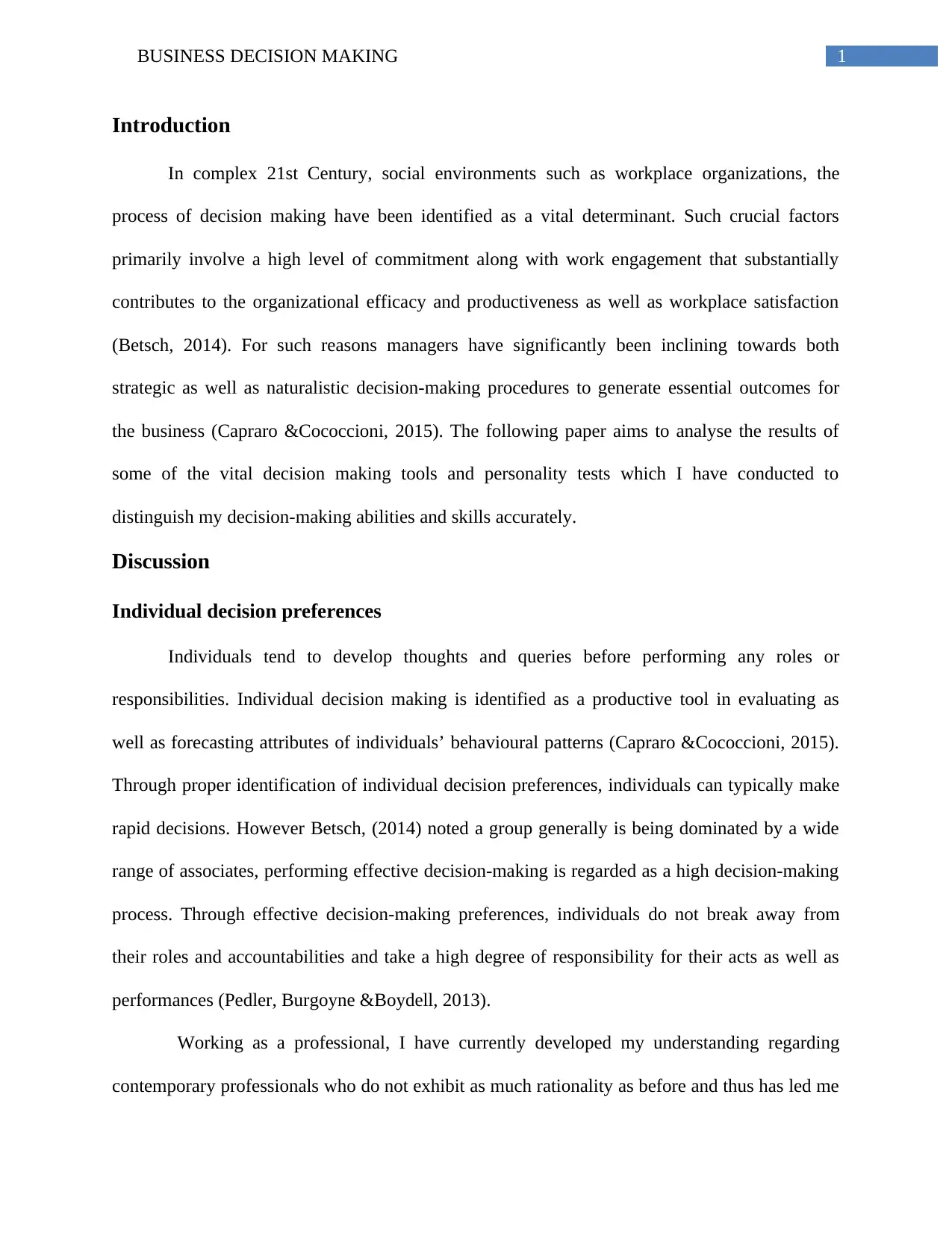
1BUSINESS DECISION MAKING
Introduction
In complex 21st Century, social environments such as workplace organizations, the
process of decision making have been identified as a vital determinant. Such crucial factors
primarily involve a high level of commitment along with work engagement that substantially
contributes to the organizational efficacy and productiveness as well as workplace satisfaction
(Betsch, 2014). For such reasons managers have significantly been inclining towards both
strategic as well as naturalistic decision-making procedures to generate essential outcomes for
the business (Capraro &Cococcioni, 2015). The following paper aims to analyse the results of
some of the vital decision making tools and personality tests which I have conducted to
distinguish my decision-making abilities and skills accurately.
Discussion
Individual decision preferences
Individuals tend to develop thoughts and queries before performing any roles or
responsibilities. Individual decision making is identified as a productive tool in evaluating as
well as forecasting attributes of individuals’ behavioural patterns (Capraro &Cococcioni, 2015).
Through proper identification of individual decision preferences, individuals can typically make
rapid decisions. However Betsch, (2014) noted a group generally is being dominated by a wide
range of associates, performing effective decision-making is regarded as a high decision-making
process. Through effective decision-making preferences, individuals do not break away from
their roles and accountabilities and take a high degree of responsibility for their acts as well as
performances (Pedler, Burgoyne &Boydell, 2013).
Working as a professional, I have currently developed my understanding regarding
contemporary professionals who do not exhibit as much rationality as before and thus has led me
Introduction
In complex 21st Century, social environments such as workplace organizations, the
process of decision making have been identified as a vital determinant. Such crucial factors
primarily involve a high level of commitment along with work engagement that substantially
contributes to the organizational efficacy and productiveness as well as workplace satisfaction
(Betsch, 2014). For such reasons managers have significantly been inclining towards both
strategic as well as naturalistic decision-making procedures to generate essential outcomes for
the business (Capraro &Cococcioni, 2015). The following paper aims to analyse the results of
some of the vital decision making tools and personality tests which I have conducted to
distinguish my decision-making abilities and skills accurately.
Discussion
Individual decision preferences
Individuals tend to develop thoughts and queries before performing any roles or
responsibilities. Individual decision making is identified as a productive tool in evaluating as
well as forecasting attributes of individuals’ behavioural patterns (Capraro &Cococcioni, 2015).
Through proper identification of individual decision preferences, individuals can typically make
rapid decisions. However Betsch, (2014) noted a group generally is being dominated by a wide
range of associates, performing effective decision-making is regarded as a high decision-making
process. Through effective decision-making preferences, individuals do not break away from
their roles and accountabilities and take a high degree of responsibility for their acts as well as
performances (Pedler, Burgoyne &Boydell, 2013).
Working as a professional, I have currently developed my understanding regarding
contemporary professionals who do not exhibit as much rationality as before and thus has led me
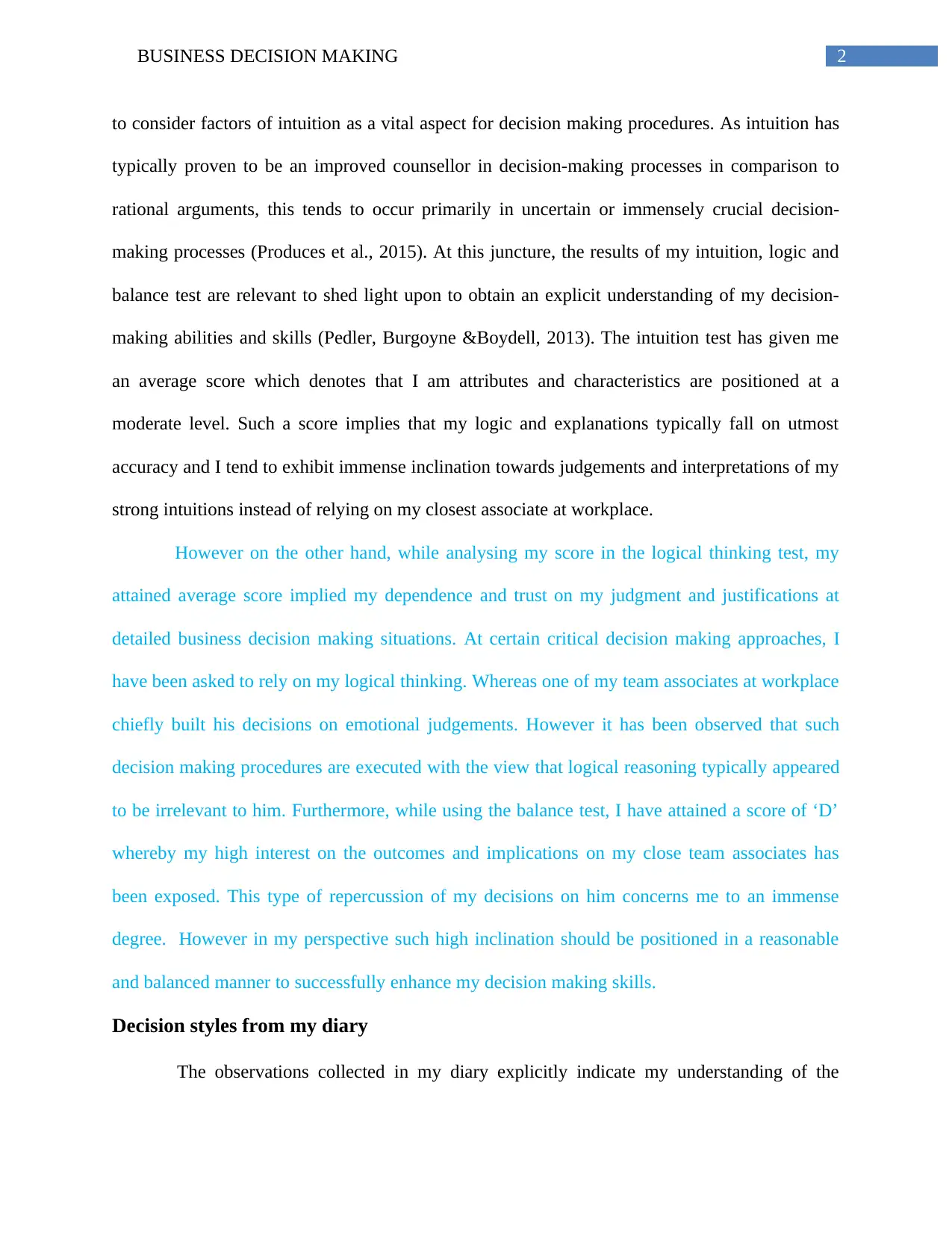
2BUSINESS DECISION MAKING
to consider factors of intuition as a vital aspect for decision making procedures. As intuition has
typically proven to be an improved counsellor in decision-making processes in comparison to
rational arguments, this tends to occur primarily in uncertain or immensely crucial decision-
making processes (Produces et al., 2015). At this juncture, the results of my intuition, logic and
balance test are relevant to shed light upon to obtain an explicit understanding of my decision-
making abilities and skills (Pedler, Burgoyne &Boydell, 2013). The intuition test has given me
an average score which denotes that I am attributes and characteristics are positioned at a
moderate level. Such a score implies that my logic and explanations typically fall on utmost
accuracy and I tend to exhibit immense inclination towards judgements and interpretations of my
strong intuitions instead of relying on my closest associate at workplace.
However on the other hand, while analysing my score in the logical thinking test, my
attained average score implied my dependence and trust on my judgment and justifications at
detailed business decision making situations. At certain critical decision making approaches, I
have been asked to rely on my logical thinking. Whereas one of my team associates at workplace
chiefly built his decisions on emotional judgements. However it has been observed that such
decision making procedures are executed with the view that logical reasoning typically appeared
to be irrelevant to him. Furthermore, while using the balance test, I have attained a score of ‘D’
whereby my high interest on the outcomes and implications on my close team associates has
been exposed. This type of repercussion of my decisions on him concerns me to an immense
degree. However in my perspective such high inclination should be positioned in a reasonable
and balanced manner to successfully enhance my decision making skills.
Decision styles from my diary
The observations collected in my diary explicitly indicate my understanding of the
to consider factors of intuition as a vital aspect for decision making procedures. As intuition has
typically proven to be an improved counsellor in decision-making processes in comparison to
rational arguments, this tends to occur primarily in uncertain or immensely crucial decision-
making processes (Produces et al., 2015). At this juncture, the results of my intuition, logic and
balance test are relevant to shed light upon to obtain an explicit understanding of my decision-
making abilities and skills (Pedler, Burgoyne &Boydell, 2013). The intuition test has given me
an average score which denotes that I am attributes and characteristics are positioned at a
moderate level. Such a score implies that my logic and explanations typically fall on utmost
accuracy and I tend to exhibit immense inclination towards judgements and interpretations of my
strong intuitions instead of relying on my closest associate at workplace.
However on the other hand, while analysing my score in the logical thinking test, my
attained average score implied my dependence and trust on my judgment and justifications at
detailed business decision making situations. At certain critical decision making approaches, I
have been asked to rely on my logical thinking. Whereas one of my team associates at workplace
chiefly built his decisions on emotional judgements. However it has been observed that such
decision making procedures are executed with the view that logical reasoning typically appeared
to be irrelevant to him. Furthermore, while using the balance test, I have attained a score of ‘D’
whereby my high interest on the outcomes and implications on my close team associates has
been exposed. This type of repercussion of my decisions on him concerns me to an immense
degree. However in my perspective such high inclination should be positioned in a reasonable
and balanced manner to successfully enhance my decision making skills.
Decision styles from my diary
The observations collected in my diary explicitly indicate my understanding of the
⊘ This is a preview!⊘
Do you want full access?
Subscribe today to unlock all pages.

Trusted by 1+ million students worldwide
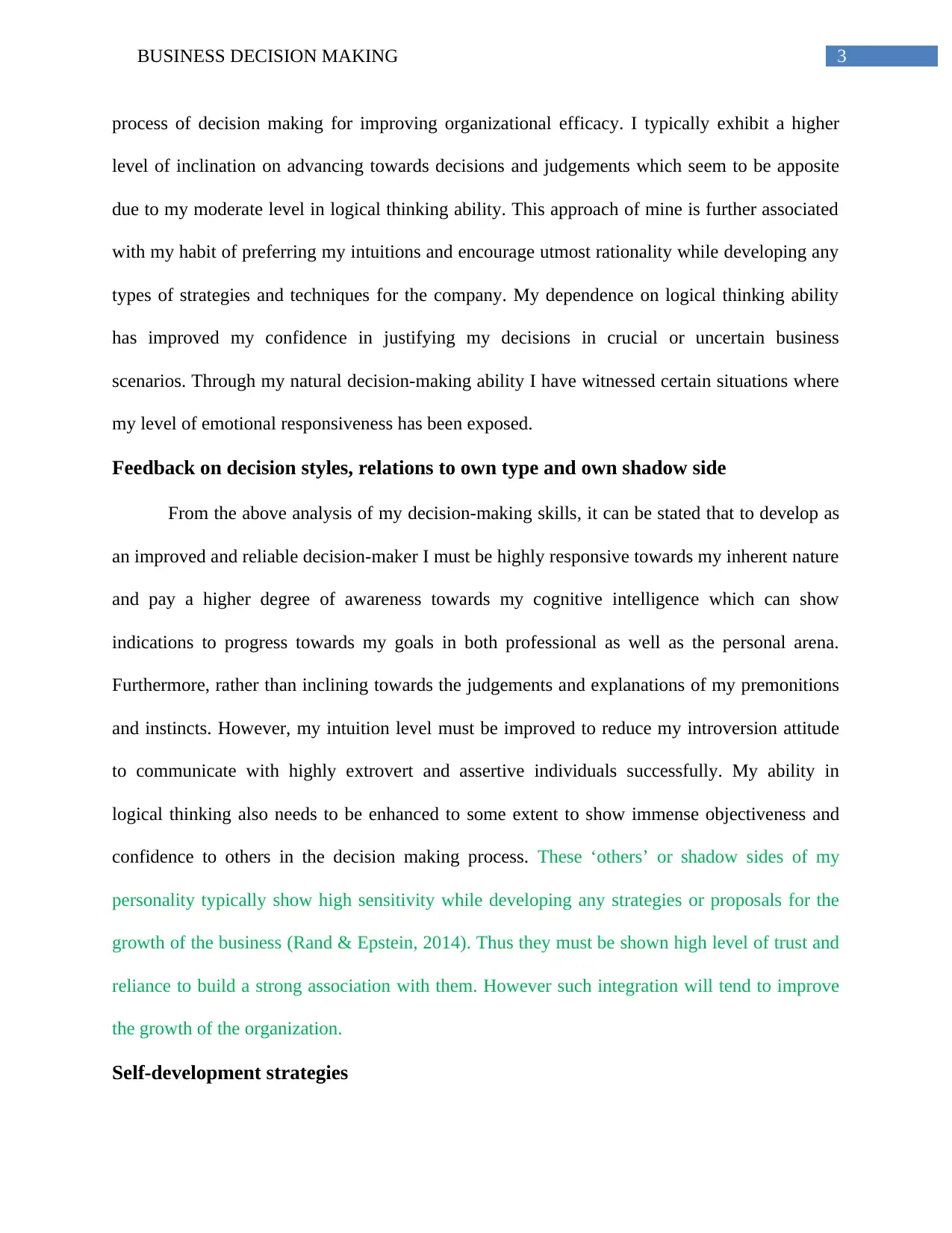
3BUSINESS DECISION MAKING
process of decision making for improving organizational efficacy. I typically exhibit a higher
level of inclination on advancing towards decisions and judgements which seem to be apposite
due to my moderate level in logical thinking ability. This approach of mine is further associated
with my habit of preferring my intuitions and encourage utmost rationality while developing any
types of strategies and techniques for the company. My dependence on logical thinking ability
has improved my confidence in justifying my decisions in crucial or uncertain business
scenarios. Through my natural decision-making ability I have witnessed certain situations where
my level of emotional responsiveness has been exposed.
Feedback on decision styles, relations to own type and own shadow side
From the above analysis of my decision-making skills, it can be stated that to develop as
an improved and reliable decision-maker I must be highly responsive towards my inherent nature
and pay a higher degree of awareness towards my cognitive intelligence which can show
indications to progress towards my goals in both professional as well as the personal arena.
Furthermore, rather than inclining towards the judgements and explanations of my premonitions
and instincts. However, my intuition level must be improved to reduce my introversion attitude
to communicate with highly extrovert and assertive individuals successfully. My ability in
logical thinking also needs to be enhanced to some extent to show immense objectiveness and
confidence to others in the decision making process. These ‘others’ or shadow sides of my
personality typically show high sensitivity while developing any strategies or proposals for the
growth of the business (Rand & Epstein, 2014). Thus they must be shown high level of trust and
reliance to build a strong association with them. However such integration will tend to improve
the growth of the organization.
Self-development strategies
process of decision making for improving organizational efficacy. I typically exhibit a higher
level of inclination on advancing towards decisions and judgements which seem to be apposite
due to my moderate level in logical thinking ability. This approach of mine is further associated
with my habit of preferring my intuitions and encourage utmost rationality while developing any
types of strategies and techniques for the company. My dependence on logical thinking ability
has improved my confidence in justifying my decisions in crucial or uncertain business
scenarios. Through my natural decision-making ability I have witnessed certain situations where
my level of emotional responsiveness has been exposed.
Feedback on decision styles, relations to own type and own shadow side
From the above analysis of my decision-making skills, it can be stated that to develop as
an improved and reliable decision-maker I must be highly responsive towards my inherent nature
and pay a higher degree of awareness towards my cognitive intelligence which can show
indications to progress towards my goals in both professional as well as the personal arena.
Furthermore, rather than inclining towards the judgements and explanations of my premonitions
and instincts. However, my intuition level must be improved to reduce my introversion attitude
to communicate with highly extrovert and assertive individuals successfully. My ability in
logical thinking also needs to be enhanced to some extent to show immense objectiveness and
confidence to others in the decision making process. These ‘others’ or shadow sides of my
personality typically show high sensitivity while developing any strategies or proposals for the
growth of the business (Rand & Epstein, 2014). Thus they must be shown high level of trust and
reliance to build a strong association with them. However such integration will tend to improve
the growth of the organization.
Self-development strategies
Paraphrase This Document
Need a fresh take? Get an instant paraphrase of this document with our AI Paraphraser
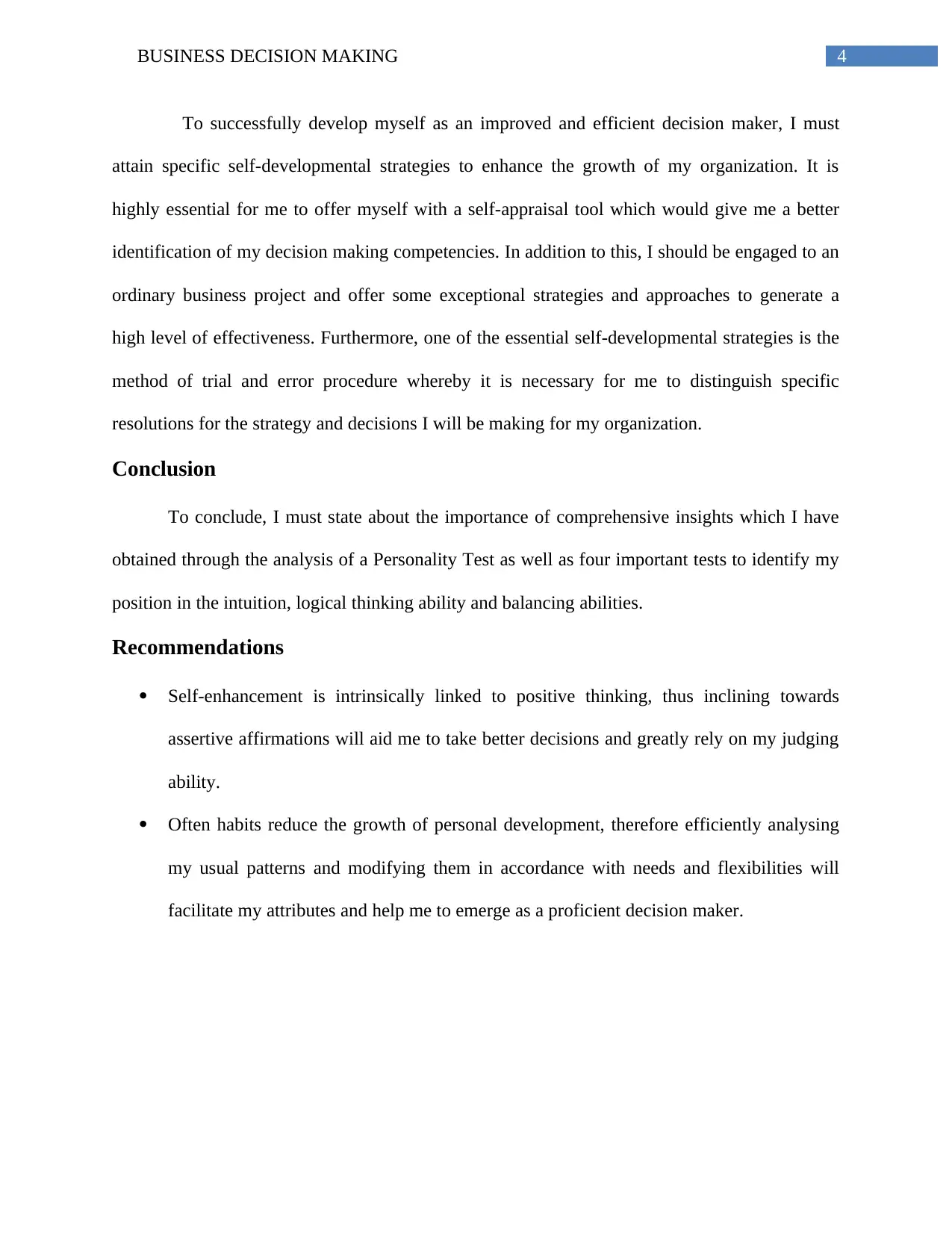
4BUSINESS DECISION MAKING
To successfully develop myself as an improved and efficient decision maker, I must
attain specific self-developmental strategies to enhance the growth of my organization. It is
highly essential for me to offer myself with a self-appraisal tool which would give me a better
identification of my decision making competencies. In addition to this, I should be engaged to an
ordinary business project and offer some exceptional strategies and approaches to generate a
high level of effectiveness. Furthermore, one of the essential self-developmental strategies is the
method of trial and error procedure whereby it is necessary for me to distinguish specific
resolutions for the strategy and decisions I will be making for my organization.
Conclusion
To conclude, I must state about the importance of comprehensive insights which I have
obtained through the analysis of a Personality Test as well as four important tests to identify my
position in the intuition, logical thinking ability and balancing abilities.
Recommendations
Self-enhancement is intrinsically linked to positive thinking, thus inclining towards
assertive affirmations will aid me to take better decisions and greatly rely on my judging
ability.
Often habits reduce the growth of personal development, therefore efficiently analysing
my usual patterns and modifying them in accordance with needs and flexibilities will
facilitate my attributes and help me to emerge as a proficient decision maker.
To successfully develop myself as an improved and efficient decision maker, I must
attain specific self-developmental strategies to enhance the growth of my organization. It is
highly essential for me to offer myself with a self-appraisal tool which would give me a better
identification of my decision making competencies. In addition to this, I should be engaged to an
ordinary business project and offer some exceptional strategies and approaches to generate a
high level of effectiveness. Furthermore, one of the essential self-developmental strategies is the
method of trial and error procedure whereby it is necessary for me to distinguish specific
resolutions for the strategy and decisions I will be making for my organization.
Conclusion
To conclude, I must state about the importance of comprehensive insights which I have
obtained through the analysis of a Personality Test as well as four important tests to identify my
position in the intuition, logical thinking ability and balancing abilities.
Recommendations
Self-enhancement is intrinsically linked to positive thinking, thus inclining towards
assertive affirmations will aid me to take better decisions and greatly rely on my judging
ability.
Often habits reduce the growth of personal development, therefore efficiently analysing
my usual patterns and modifying them in accordance with needs and flexibilities will
facilitate my attributes and help me to emerge as a proficient decision maker.
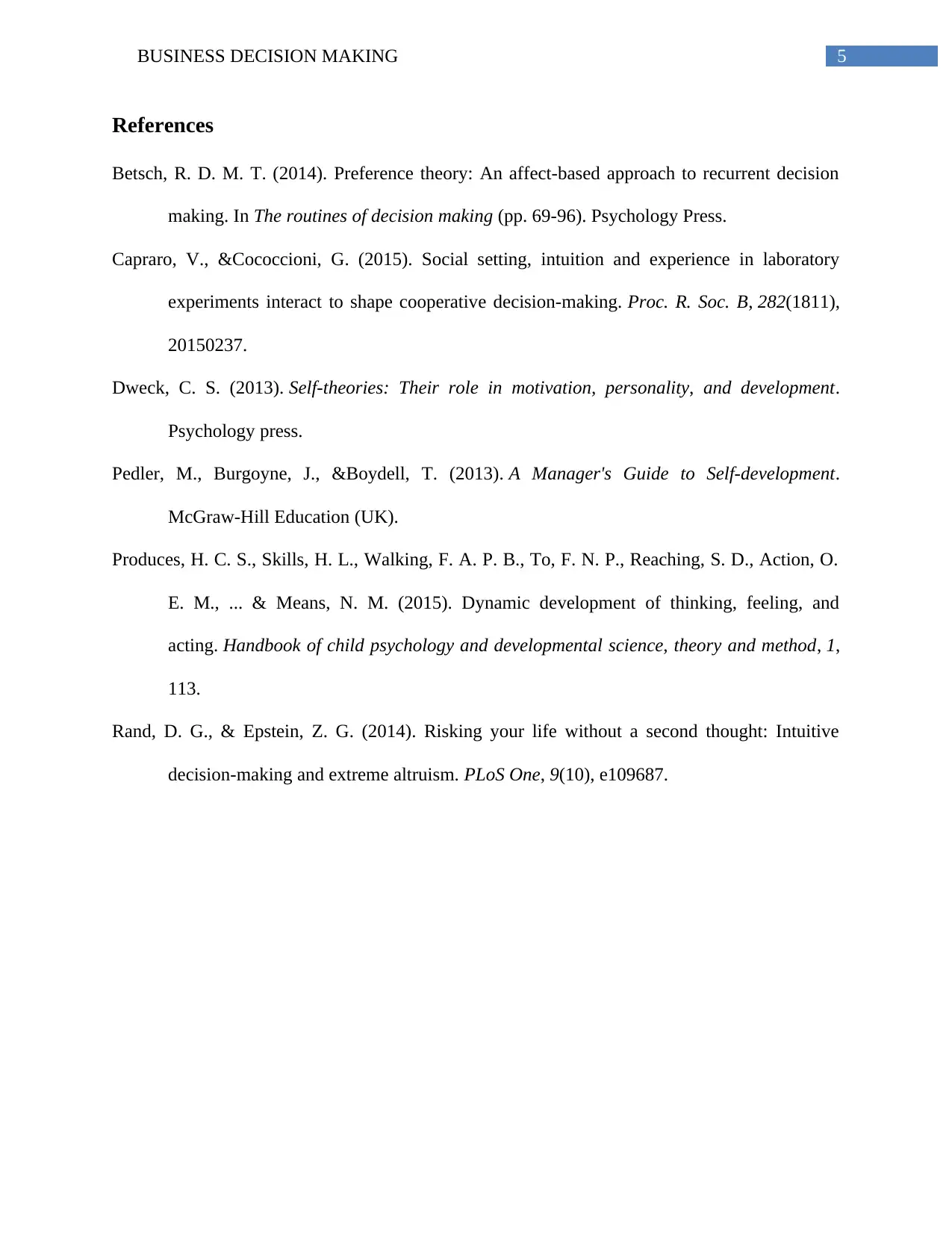
5BUSINESS DECISION MAKING
References
Betsch, R. D. M. T. (2014). Preference theory: An affect-based approach to recurrent decision
making. In The routines of decision making (pp. 69-96). Psychology Press.
Capraro, V., &Cococcioni, G. (2015). Social setting, intuition and experience in laboratory
experiments interact to shape cooperative decision-making. Proc. R. Soc. B, 282(1811),
20150237.
Dweck, C. S. (2013). Self-theories: Their role in motivation, personality, and development.
Psychology press.
Pedler, M., Burgoyne, J., &Boydell, T. (2013). A Manager's Guide to Self-development.
McGraw-Hill Education (UK).
Produces, H. C. S., Skills, H. L., Walking, F. A. P. B., To, F. N. P., Reaching, S. D., Action, O.
E. M., ... & Means, N. M. (2015). Dynamic development of thinking, feeling, and
acting. Handbook of child psychology and developmental science, theory and method, 1,
113.
Rand, D. G., & Epstein, Z. G. (2014). Risking your life without a second thought: Intuitive
decision-making and extreme altruism. PLoS One, 9(10), e109687.
References
Betsch, R. D. M. T. (2014). Preference theory: An affect-based approach to recurrent decision
making. In The routines of decision making (pp. 69-96). Psychology Press.
Capraro, V., &Cococcioni, G. (2015). Social setting, intuition and experience in laboratory
experiments interact to shape cooperative decision-making. Proc. R. Soc. B, 282(1811),
20150237.
Dweck, C. S. (2013). Self-theories: Their role in motivation, personality, and development.
Psychology press.
Pedler, M., Burgoyne, J., &Boydell, T. (2013). A Manager's Guide to Self-development.
McGraw-Hill Education (UK).
Produces, H. C. S., Skills, H. L., Walking, F. A. P. B., To, F. N. P., Reaching, S. D., Action, O.
E. M., ... & Means, N. M. (2015). Dynamic development of thinking, feeling, and
acting. Handbook of child psychology and developmental science, theory and method, 1,
113.
Rand, D. G., & Epstein, Z. G. (2014). Risking your life without a second thought: Intuitive
decision-making and extreme altruism. PLoS One, 9(10), e109687.
⊘ This is a preview!⊘
Do you want full access?
Subscribe today to unlock all pages.

Trusted by 1+ million students worldwide
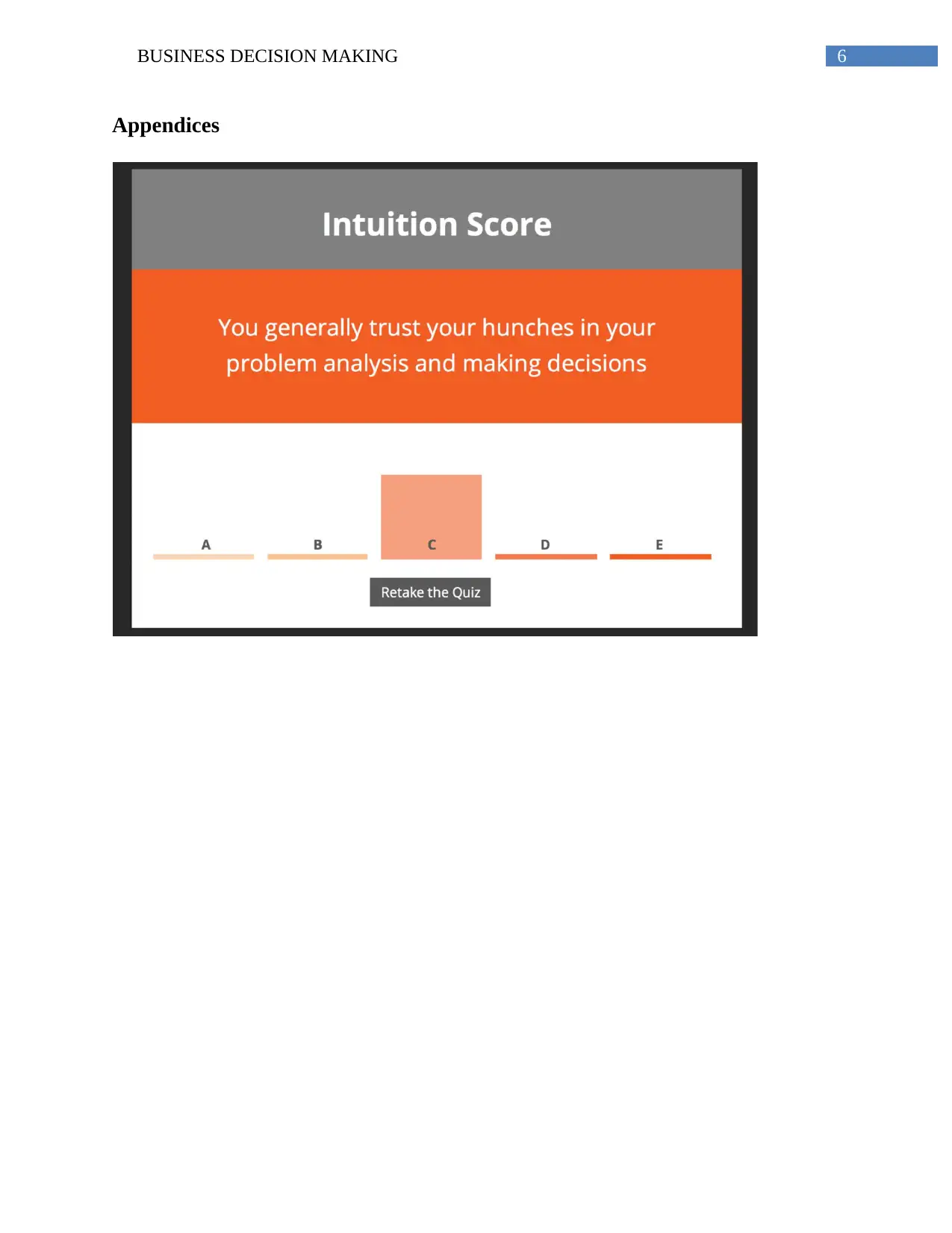
6BUSINESS DECISION MAKING
Appendices
Appendices
Paraphrase This Document
Need a fresh take? Get an instant paraphrase of this document with our AI Paraphraser
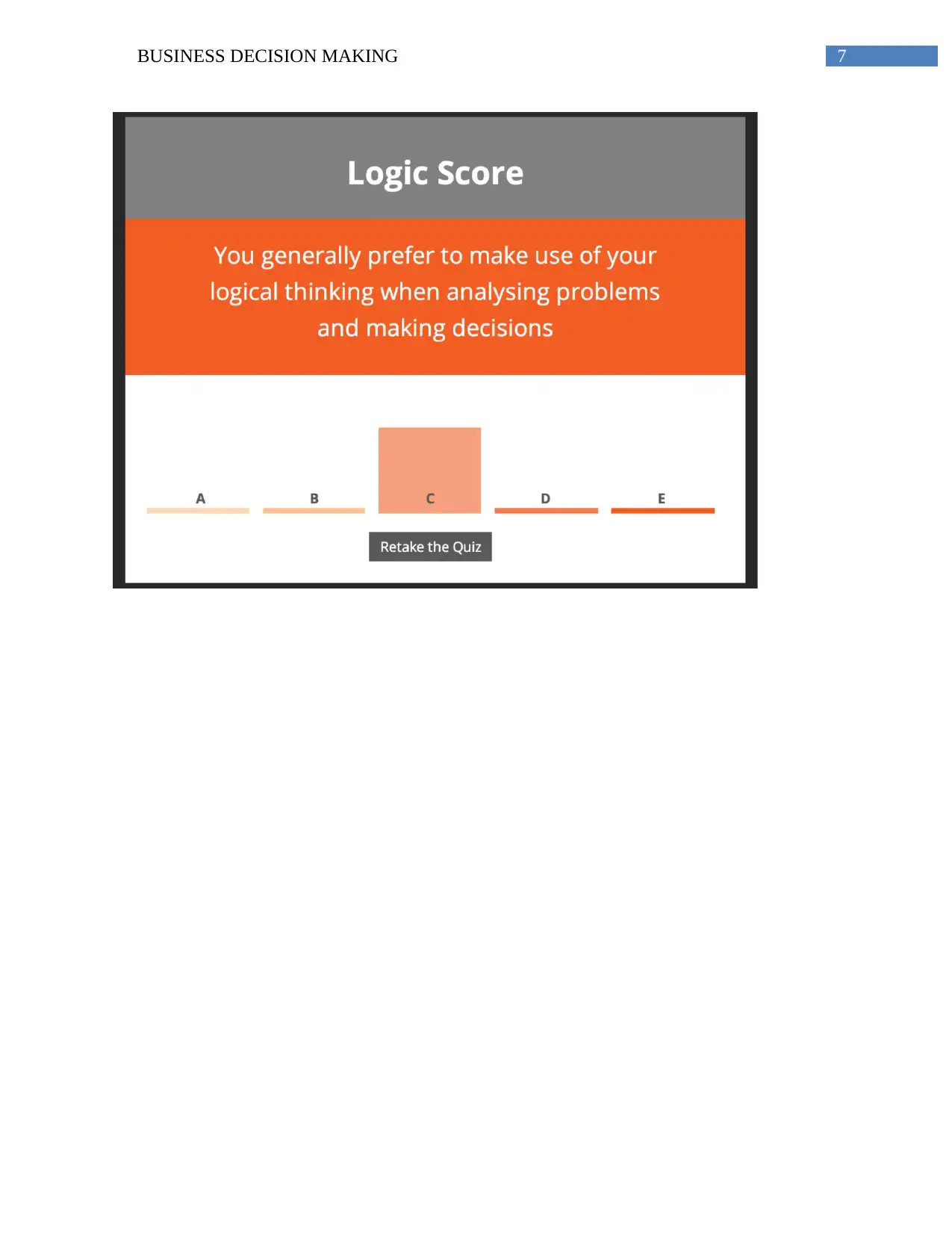
7BUSINESS DECISION MAKING
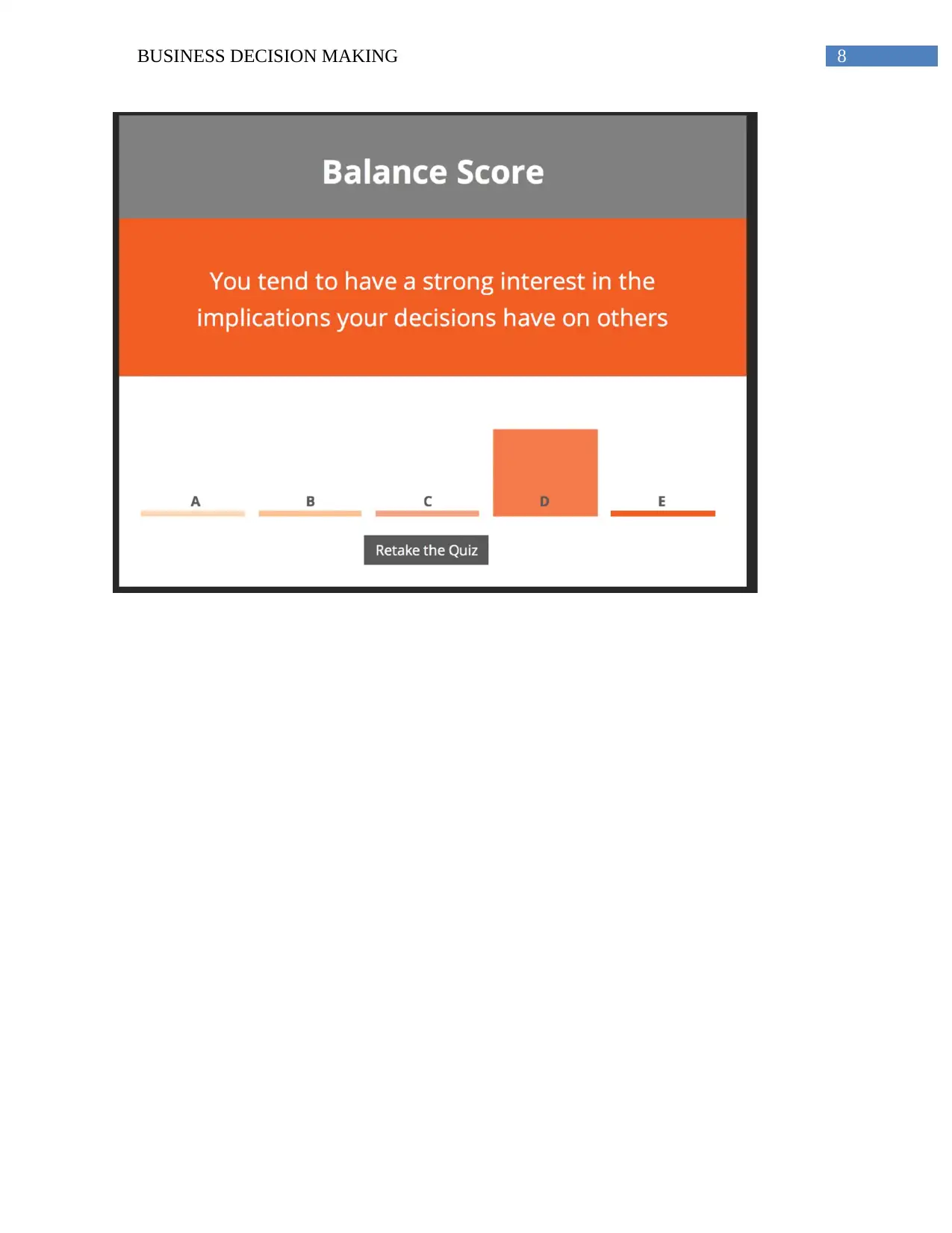
8BUSINESS DECISION MAKING
⊘ This is a preview!⊘
Do you want full access?
Subscribe today to unlock all pages.

Trusted by 1+ million students worldwide
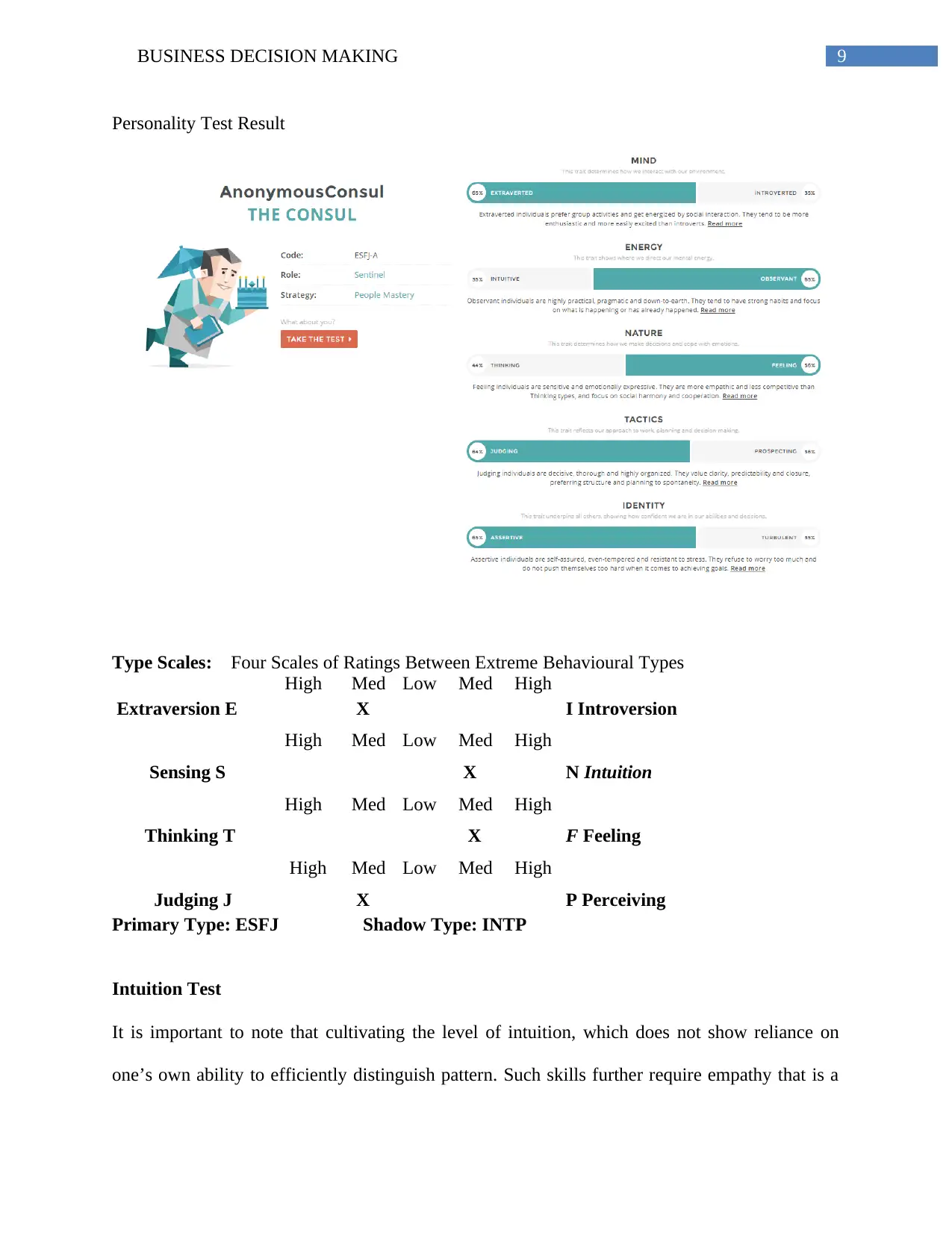
9BUSINESS DECISION MAKING
Personality Test Result
Type Scales: Four Scales of Ratings Between Extreme Behavioural Types
High Med Low Med High
Extraversion E X I Introversion
High Med Low Med High
Sensing S X N Intuition
High Med Low Med High
Thinking T X F Feeling
High Med Low Med High
Judging J X P Perceiving
Primary Type: ESFJ Shadow Type: INTP
Intuition Test
It is important to note that cultivating the level of intuition, which does not show reliance on
one’s own ability to efficiently distinguish pattern. Such skills further require empathy that is a
Personality Test Result
Type Scales: Four Scales of Ratings Between Extreme Behavioural Types
High Med Low Med High
Extraversion E X I Introversion
High Med Low Med High
Sensing S X N Intuition
High Med Low Med High
Thinking T X F Feeling
High Med Low Med High
Judging J X P Perceiving
Primary Type: ESFJ Shadow Type: INTP
Intuition Test
It is important to note that cultivating the level of intuition, which does not show reliance on
one’s own ability to efficiently distinguish pattern. Such skills further require empathy that is a
Paraphrase This Document
Need a fresh take? Get an instant paraphrase of this document with our AI Paraphraser
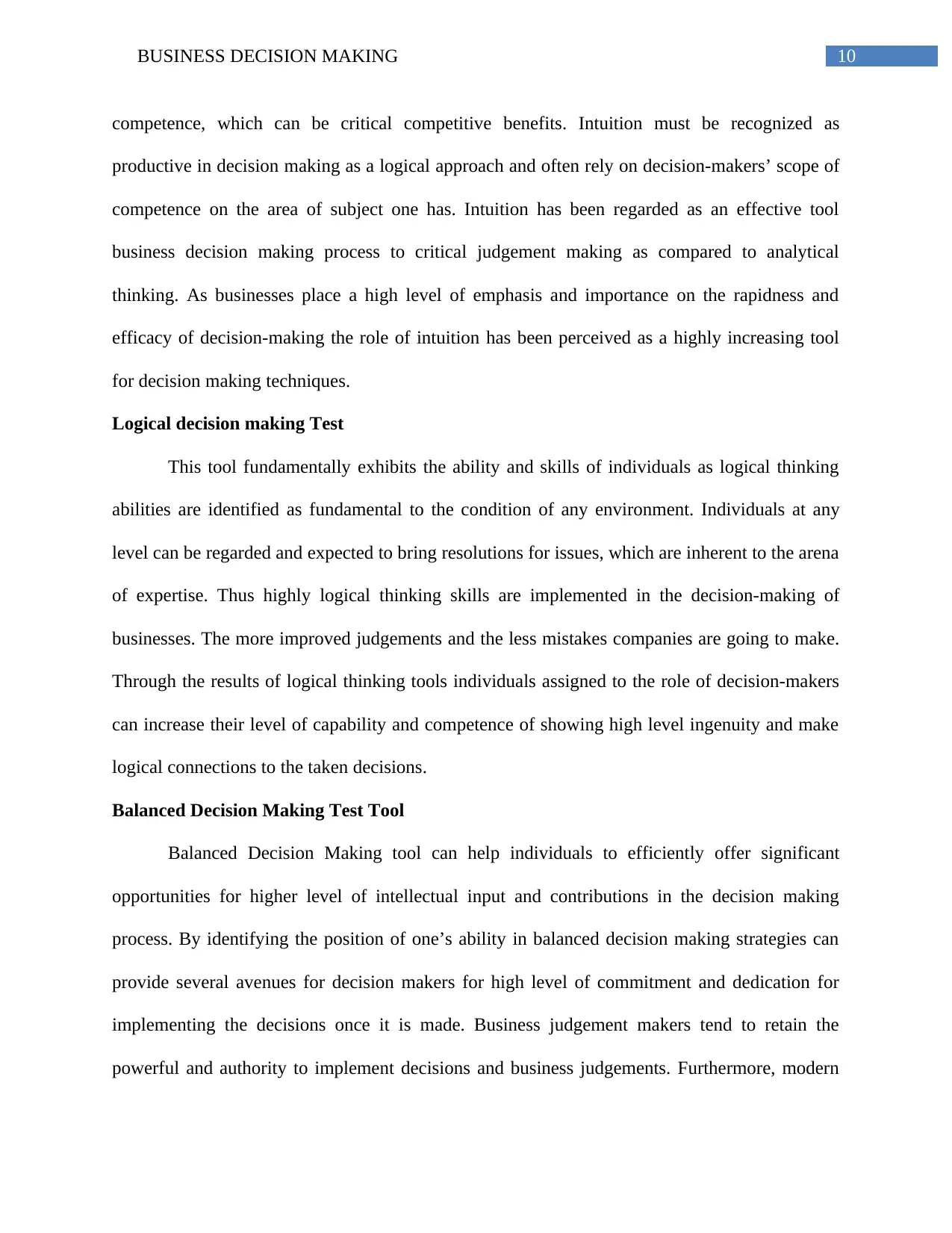
10BUSINESS DECISION MAKING
competence, which can be critical competitive benefits. Intuition must be recognized as
productive in decision making as a logical approach and often rely on decision-makers’ scope of
competence on the area of subject one has. Intuition has been regarded as an effective tool
business decision making process to critical judgement making as compared to analytical
thinking. As businesses place a high level of emphasis and importance on the rapidness and
efficacy of decision-making the role of intuition has been perceived as a highly increasing tool
for decision making techniques.
Logical decision making Test
This tool fundamentally exhibits the ability and skills of individuals as logical thinking
abilities are identified as fundamental to the condition of any environment. Individuals at any
level can be regarded and expected to bring resolutions for issues, which are inherent to the arena
of expertise. Thus highly logical thinking skills are implemented in the decision-making of
businesses. The more improved judgements and the less mistakes companies are going to make.
Through the results of logical thinking tools individuals assigned to the role of decision-makers
can increase their level of capability and competence of showing high level ingenuity and make
logical connections to the taken decisions.
Balanced Decision Making Test Tool
Balanced Decision Making tool can help individuals to efficiently offer significant
opportunities for higher level of intellectual input and contributions in the decision making
process. By identifying the position of one’s ability in balanced decision making strategies can
provide several avenues for decision makers for high level of commitment and dedication for
implementing the decisions once it is made. Business judgement makers tend to retain the
powerful and authority to implement decisions and business judgements. Furthermore, modern
competence, which can be critical competitive benefits. Intuition must be recognized as
productive in decision making as a logical approach and often rely on decision-makers’ scope of
competence on the area of subject one has. Intuition has been regarded as an effective tool
business decision making process to critical judgement making as compared to analytical
thinking. As businesses place a high level of emphasis and importance on the rapidness and
efficacy of decision-making the role of intuition has been perceived as a highly increasing tool
for decision making techniques.
Logical decision making Test
This tool fundamentally exhibits the ability and skills of individuals as logical thinking
abilities are identified as fundamental to the condition of any environment. Individuals at any
level can be regarded and expected to bring resolutions for issues, which are inherent to the arena
of expertise. Thus highly logical thinking skills are implemented in the decision-making of
businesses. The more improved judgements and the less mistakes companies are going to make.
Through the results of logical thinking tools individuals assigned to the role of decision-makers
can increase their level of capability and competence of showing high level ingenuity and make
logical connections to the taken decisions.
Balanced Decision Making Test Tool
Balanced Decision Making tool can help individuals to efficiently offer significant
opportunities for higher level of intellectual input and contributions in the decision making
process. By identifying the position of one’s ability in balanced decision making strategies can
provide several avenues for decision makers for high level of commitment and dedication for
implementing the decisions once it is made. Business judgement makers tend to retain the
powerful and authority to implement decisions and business judgements. Furthermore, modern
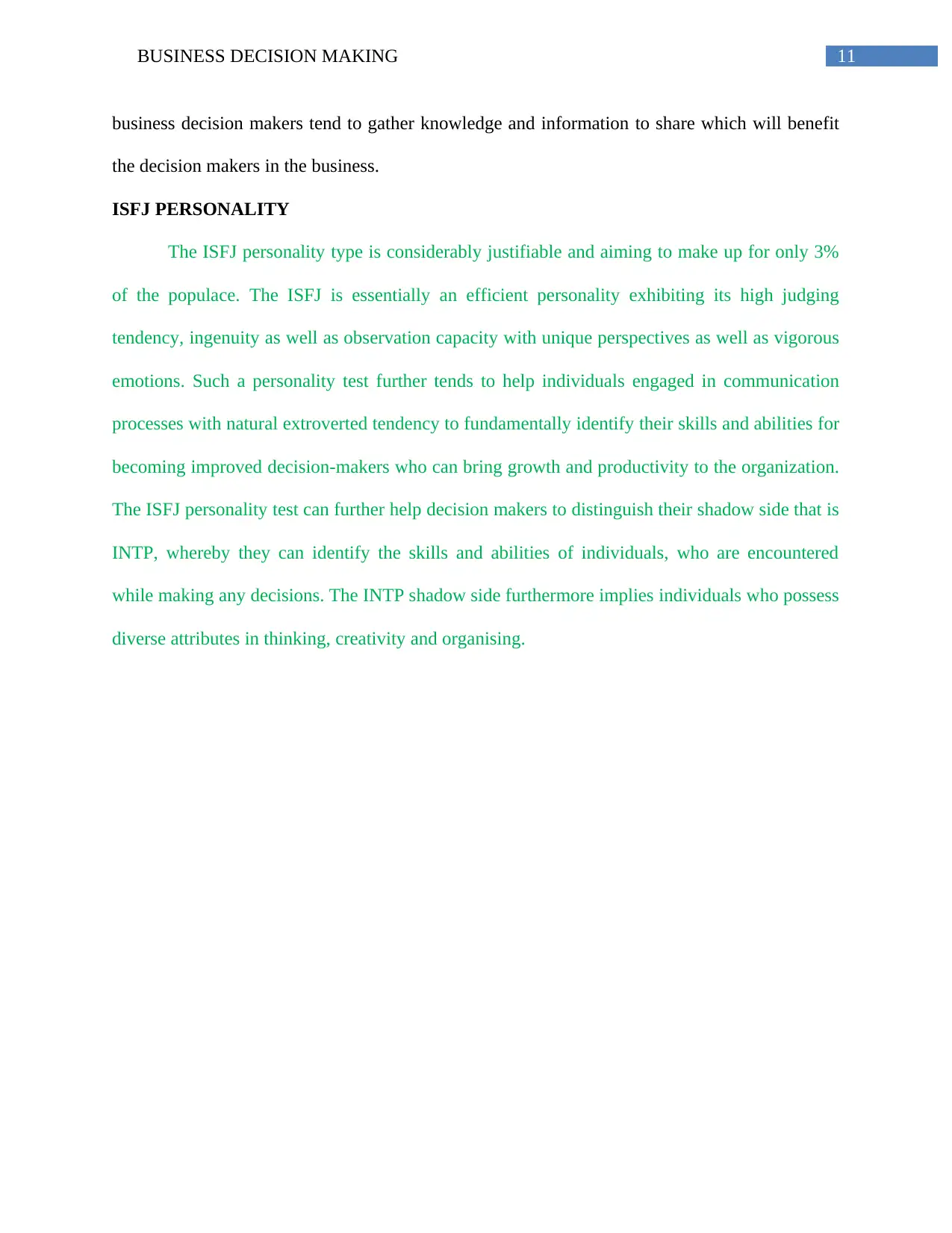
11BUSINESS DECISION MAKING
business decision makers tend to gather knowledge and information to share which will benefit
the decision makers in the business.
ISFJ PERSONALITY
The ISFJ personality type is considerably justifiable and aiming to make up for only 3%
of the populace. The ISFJ is essentially an efficient personality exhibiting its high judging
tendency, ingenuity as well as observation capacity with unique perspectives as well as vigorous
emotions. Such a personality test further tends to help individuals engaged in communication
processes with natural extroverted tendency to fundamentally identify their skills and abilities for
becoming improved decision-makers who can bring growth and productivity to the organization.
The ISFJ personality test can further help decision makers to distinguish their shadow side that is
INTP, whereby they can identify the skills and abilities of individuals, who are encountered
while making any decisions. The INTP shadow side furthermore implies individuals who possess
diverse attributes in thinking, creativity and organising.
business decision makers tend to gather knowledge and information to share which will benefit
the decision makers in the business.
ISFJ PERSONALITY
The ISFJ personality type is considerably justifiable and aiming to make up for only 3%
of the populace. The ISFJ is essentially an efficient personality exhibiting its high judging
tendency, ingenuity as well as observation capacity with unique perspectives as well as vigorous
emotions. Such a personality test further tends to help individuals engaged in communication
processes with natural extroverted tendency to fundamentally identify their skills and abilities for
becoming improved decision-makers who can bring growth and productivity to the organization.
The ISFJ personality test can further help decision makers to distinguish their shadow side that is
INTP, whereby they can identify the skills and abilities of individuals, who are encountered
while making any decisions. The INTP shadow side furthermore implies individuals who possess
diverse attributes in thinking, creativity and organising.
⊘ This is a preview!⊘
Do you want full access?
Subscribe today to unlock all pages.

Trusted by 1+ million students worldwide
1 out of 12
Your All-in-One AI-Powered Toolkit for Academic Success.
+13062052269
info@desklib.com
Available 24*7 on WhatsApp / Email
![[object Object]](/_next/static/media/star-bottom.7253800d.svg)
Unlock your academic potential
Copyright © 2020–2025 A2Z Services. All Rights Reserved. Developed and managed by ZUCOL.